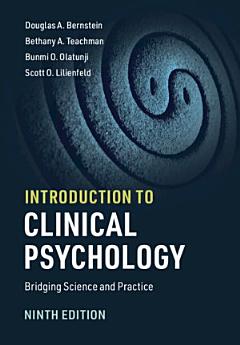Introduction to Clinical Psychology: Bridging Science and Practice, Edition 9
এই ইবুকখনৰ বিষয়ে
মূল্যাংকন আৰু পৰ্যালোচনাসমূহ
লিখকৰ বিষয়ে
Douglas Bernstein is Professor Emeritus at the University of Illinois, and Courtesy Professor of Psychology at the University of South Florida. He founded the APS Preconference Institute on the Teaching of Psychology and the APS Preconference Institute on the Teaching of Psychological Science at the biennial APS International Convention of Psychological Science. He served as the founding chairman of the APS Fund for the Teaching and Public Understanding of Psychological Science. He served for thirty years as chairman of the National Institute on the Teaching of Psychology and has won several teaching awards, including the APA Distinguished Teaching in Psychology Award.
Bethany Teachman is a Professor and the Director of Clinical Training at the University of Virginia in the Department of Psychology. Her lab investigates biased thinking that contributes to the development and maintenance of psychopathology, especially anxiety disorders. She received her PhD from Yale University, Connecticut, and her BA from the University of British Columbia. Dr Teachman has been awarded an American Psychological Association Distinguished Scientific Early Career Award, national mentoring awards, and she is a Fellow of multiple associations, including the American Association for the Advancement of Science. Currently, Dr Teachman is Chair of the Coalition for the Advancement and Application of Psychological Science and she received a Presidential Citation from the American Psychological Association.
Bunmi O. Olatunji is Gertrude Conaway Vanderbilt Professor of Psychology, Associate Professor of Psychiatry and Director of Clinical Training at Vanderbilt University, Tennessee. He has published more than 160 journal articles and book chapters. He has been the recipient of the American Psychological Association (APA) Division 12 David Shakow Early Career Award for Distinguished Scientific Contributions to Clinical Psychology, the Association for the Advancement of Behavioral and Cognitive Therapies New Researcher Award, and the APA Division 12 Theodore Blau Early Career Award for Distinguished Professional Contributions to Clinical Psychology. He is also the recipient of the APA Distinguished Scientific Awards for an Early Career Contribution to Psychology, which recognizes excellent psychologists who are at early stages of their research careers.
The late Scott O. Lilienfeld was Samuel Candler Dobbs Professor of Psychology at Emory University, Atlanta, and Visiting Professor in the School of Psychological Sciences at the University of Melbourne. His primary areas of interest were personality and personality disorders, individual differences in cognitive bias propensity, evidence-based practice in clinical psychology, psychiatric classification, and applications of scientific thinking to psychology. He was (twice) past-president of the Society for a Science of Clinical Psychology and the recipient of several awards, including the James McKeen Cattell Award for Lifetime Contributions to Applied Psychological Science from the Association for Psychological Science and the Ernst R. Hilgard Award for Lifetime Career Contributions to General Psychology from Division 1 (General Psychology) of the American Psychological Association. He was the editor-in-chief of the journal Clinical Psychological Science and author or co-author of over a dozen books, including 50 Great Myths of Popular Psychology (Wiley) and Psychology: From Inquiry to Understanding (Pearson).





